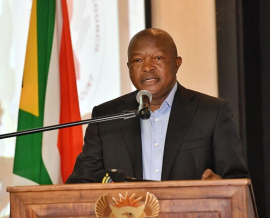
Government will embark on Tuberculosis (TB) catch-up programmes as it continues to pursue shortened treatment after the infectious disease took a backseat due to COVID-19.
Deputy President David Mabuza announced this on Friday during the South African National Aids Council (SANAC) extended plenary in Rustenburg, North West.
“The COVID-19 pandemic exacerbated the situation by reversing the gains made in the fight against TB in South Africa and around the world. However, the country has made a conscious effort to begin rebuilding, confront the status quo, and intensify TB interventions,” he told the delegates.
According to the Deputy President, SANAC has begun coordinating and backing the development of the multi-sectoral TB recovery plan, including the TB catch-up programmes and the development of the TB multi-sectoral accountability framework supported by the World Health Organisation (WHO).
“Both are roadmaps to ensure a collective response to TB and steer South Africa towards winning the battle against TB,” he explained.
South Africa is one of the 30 high-burden TB countries contributing 87% of the estimated incident cases globally and among the 14 States with the highest burden of TB, TB/HIV and multi-drug resistant TB (MDR-TB).
WATCH |  SANAC extended plenary
SANAC extended plenary
In the meantime, Deputy President Mabuza, who is also the SANAC Chairperson, said the body will continue to rally behind government’s efforts to push for shorter and more cost-effective TB prevention and treatment regimens that are key for successful adherence.
“Affordability of medicines continues to impact access and pharmaceutical companies need to partner with government to improve access not only to prevention regimens but also to medicines for treating multidrug-resistant TB.”
However, according to the Deputy President, what also remains paramount is the strengthening of access to psychosocial, nutritional, and socio-economic support to ensure successful TB treatment completion.
“The ongoing advocacy efforts led by civil society for the rollout of TB preventive therapy among the high-risk groups is central to our continued efforts to address TB-related challenges. Currently, the well-performing preventive therapy regimen is mostly available in Global Fund-supported districts and we need to upscale this, to ensure that it is accessible across the country.”
On HIV, he raised concern about the country’s high rates of new HIV infection among the youth.
“We, therefore, welcome the newly launched National Youth HIV Prevention Strategy and Campaign dubbed ‘Zikhala Kanjani’, which was launched in Limpopo during Youth Month under the leadership of the Department of Health’s youth champion, Deputy Minister Sibongiseni Dhlomo.”
Deputy President believes the use of Nguni colloquial term was a positive step toward reaching the youth with efficient and focused activities that speak to them.
Meanwhile, he said youngsters will also be employed to spread messages about prevention, treatment adherence, substance abuse, mental health, teenage and child pregnancies, youth unemployment and gender-based violence and femicide.
In addition, he reported that the SANAC has made significant progress in the process of developing the new National Strategic Plan for HIV, TB and STIs for the period 2023 to 2028 launched in March this year.
“A few targeted consultations have also taken place, with more being planned to take place within the next few weeks. Engagements regarding the National Strategic Plan Provincial Implementation Plans are also underway.”
Meanwhile, he said government was planning to launch the new National Strategic Plan at the next World TB Day on 24 March 2023.
“Immediately thereafter, the rolling launches of the National Strategic Plan Provincial Implementation Plans shall ensue. Effective implementation of the National Strategic Plan is largely dependent on proper alignment between national and provincial structures,” he added. – SAnews.gov.za


